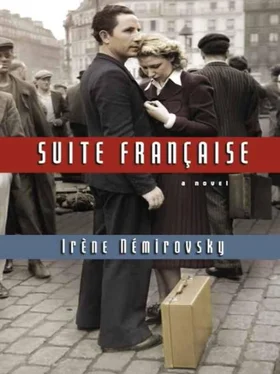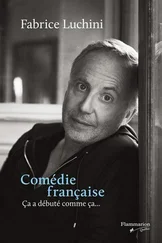Irène Némirovsky - Suite Française
Здесь есть возможность читать онлайн «Irène Némirovsky - Suite Française» весь текст электронной книги совершенно бесплатно (целиком полную версию без сокращений). В некоторых случаях можно слушать аудио, скачать через торрент в формате fb2 и присутствует краткое содержание. Жанр: Историческая проза, на английском языке. Описание произведения, (предисловие) а так же отзывы посетителей доступны на портале библиотеки ЛибКат.
- Название:Suite Française
- Автор:
- Жанр:
- Год:неизвестен
- ISBN:нет данных
- Рейтинг книги:4 / 5. Голосов: 1
-
Избранное:Добавить в избранное
- Отзывы:
-
Ваша оценка:
- 80
- 1
- 2
- 3
- 4
- 5
Suite Française: краткое содержание, описание и аннотация
Предлагаем к чтению аннотацию, описание, краткое содержание или предисловие (зависит от того, что написал сам автор книги «Suite Française»). Если вы не нашли необходимую информацию о книге — напишите в комментариях, мы постараемся отыскать её.
"A book of exceptional literary quality… it has the kind of intimacy found in the diary of Anne Frank."-The Times Literary Supplement
"Heroic… a novel about a nightmare in which the author is entirely embedded."-ANITA BROOKNER, The Spectator
"An exceptionally forceful and frank testimony… a real find. A masterpiece."-L'Express
"Remarkable as the story of the publication of Suite Française is, it will finally be of anecdotal interest compared with the importance of the book. Here is the work of a fine novelist at the top of her form, writing about the fate of her adopted country with a pitiless clarity."-Evening Standard
Suite Française — читать онлайн бесплатно полную книгу (весь текст) целиком
Ниже представлен текст книги, разбитый по страницам. Система сохранения места последней прочитанной страницы, позволяет с удобством читать онлайн бесплатно книгу «Suite Française», без необходимости каждый раз заново искать на чём Вы остановились. Поставьте закладку, и сможете в любой момент перейти на страницу, на которой закончили чтение.
Интервал:
Закладка:
And yet, despite the waves of hatred she felt towards Lucile because she was there and her own son was not, in spite of everything she might have imagined or suspected, she never thought her daughter-in-law and the German could possibly care for each other. After all, people judge one another according to their own feelings. It is only the miser who sees others enticed by money, the lustful who see others obsessed by desire. To Madame Angellier, a German was not a man, he was the personification of cruelty, perversity and hatred. For anyone else to feel differently was preposterous, incredible. She couldn't imagine Lucile in love with a German any more than she could imagine a woman mating with some mythical creature, a unicorn, a dragon or the monster Sainte Marthe killed to free Tarascon. Nor did it seem possible that the German could be in love with Lucile. Madame Angellier refused to accord him any human feelings. She interpreted his long looks as a further attempt to insult this already defiled French home, as a way of feeling cruel pleasure at having the mother and wife of a prisoner of war at his mercy. What she called Lucile's "insensitivity" irritated her more than anything else: "She's trying out new hairstyles, wearing new dresses. Doesn't she realise the German will think she's doing it for him? How degrading!" She wanted to cover Lucile's face with a mask and dress her in a sack. It pained her to see Lucile looking healthy and beautiful. She was suffering: "And all this time, my son, my own son…"
It was, for Madame Angellier, a moment of intense pleasure when they ran into the German in the hall one day and saw he was very pale and wore his arm in a sling-quite ostentatiously, in Madame Angellier's opinion. She was outraged to hear Lucile quickly ask, without thinking, "What happened to you, mein Herr?"
"I came off a horse. A difficult animal I was riding for the first time."
"You don't look well," said Lucile when she saw the German's haggard face. "You should go and lie down."
"No, no… It's only a graze and in any case…" He indicated the sound of the regiment going past their windows. "Manoeuvres…"
"What? Again?"
"We're at war," he said.
He smiled slightly and, after a brief salute, he left.
"What are you doing?" Madame Angellier exclaimed sharply. Lucile had pushed aside the curtain and was watching the soldiers go by. "You have absolutely no sense of propriety. When Germans march by, the windows and shutters should be closed… like in '70…"
"Yes, when they march into a town for the first time… But since they walk around our streets nearly every day, we'd be condemned to perpetual darkness if we followed tradition to the letter," Lucile replied impatiently.
It was a stormy night; a yellowish light fell on all the soldiers. They held their heads high and moved their lips in song. Their music began softly, as if restrained, suppressed, but it would soon burst forth into a magnificent, solemn chorale.
"They've got some funny songs," the locals said. "You can't help listening… They're like prayers."
A streak of red lightning flashed across the setting sun and seemed to pour blood over the tight-fitting helmets, the green uniforms, the officer on horseback who commanded the detachment. Even Madame Angellier was impressed.
"If only it were an omen…" she murmured.
Manoeuvres finished at midnight. Lucile heard the sound of the courtyard doors open and close again. She recognised the officer's footsteps in the hall. She sighed. She couldn't sleep. Another bad night. They were all the same now: miserable sleeplessness or confused nightmares. She was up by six o'clock. But that didn't help: all it did was to make the days longer, emptier.
The cook told the Angellier ladies that the officer had come home ill and had been visited by the Major who had seen he had a fever and ordered him to stay in his room. At noon, two German soldiers arrived with a meal that the injured man wouldn't eat. He was staying in his room but he wasn't staying in bed. They could hear him pacing back and forth, and the monotonous footsteps annoyed Madame Angellier so much that she retired immediately after lunch. This was not like her. Usually she would spend the afternoon in the drawing room doing her accounts or knitting. Only after four o'clock would she go up to her rooms on the second floor, where she was insulated from all noise. Finally Lucile could breathe easily. She sometimes wondered what her mother-in-law did up there, in the darkness. She closed the shutters and windows, and never put on a light, so she couldn't be reading. Besides, she never read. Maybe she kept on knitting in the dark, making great long scarves for the prisoners of war with the confidence of a blind woman who doesn't need to look at what she is doing. Or was she praying? Sleeping? She would come downstairs at seven o'clock without a single strand of hair out of place, stiff and silent in her black dress.
On this day and the ones that followed, Lucile heard her lock her bedroom door, then nothing else; the house seemed dead; only the German's steady footsteps broke the silence. But Madame Angellier didn't hear them; she was safely tucked away behind her thick walls, all sound deadened by her draperies. Hers was a large, dark, heavily furnished room. Madame Angellier would begin by closing the shutters and curtains to make it even darker. Then she would sink into a large green armchair with tapestry upholstery, fold her translucent hands in her lap and close her eyes. Sometimes a few bright, rare tears trickled down her cheeks-the reluctant tears of the very old who have finally accepted that sorrow is futile. She would wipe them away almost angrily and, sitting up straight, murmur, "Come along now, aren't you tired? You've been running again, and right after lunch when you should be digesting your food; you're sweating. Come along, Gaston, bring your little stool. Put it here next to Mama. You can read for me. But rest for a while first. You can lay your little head on Mama's lap." Softly, lovingly, she stroked imaginary curls.
It was neither delirium nor the first signs of madness; never had she been more totally lucid and aware of herself. It was deliberate play-acting, the only thing that brought her some solace, in the same way as morphine or wine. In the darkness and the silence, she could relive the past; she resurrected moments she herself had thought were lost for ever; treasured memories resurfaced; she would remember certain words her son had said, certain intonations in his voice, a gesture he made with his chubby little hands when he was a baby, memories that, truly, for just an instant, could take her back in time. It was no longer her imagination but reality itself, rediscovered through her enduring memories, for nothing could change the fact that these things had actually happened. Absence, even death, could not erase the past; the pink smock her son had worn, the way he cried and held out his hand to her when he'd been stung by nettles, all these things had happened and it was within her power, as long as she was still alive, to bring them back to life. All she needed was solitude, darkness, the furniture around her and these objects that her son had touched. She would vary her hallucinations to suit her mood.
Not content merely with the past, she anticipated the future; she moulded the present to her will. Though she lied and deceived herself, the lies were her own creation and she cherished them. For very brief moments she was happy. Her happiness was not hampered by the restrictions of reality. Everything was possible, everything within reach. First of all the war was over. That was the starting point of her dream, the springboard from which she could launch herself towards endless joy. The war was over… It was a day like any other… Tomorrow-why not? She would know nothing until the very last minute; she didn't read the papers any more, didn't listen to the radio. It would be like a bolt from the blue. One morning, she would go down to the kitchen and see the cook wide-eyed: "Haven't you heard, Madame?" The surrender of the King of Belgium, the fall of Paris, the arrival of the Germans, the Armistice… She had learned about all these in just this way. Well, why not peace too? Why not: "Madame, it seems it's all over! It seems no one's fighting any more, there's no more war, the prisoners are coming home!" She couldn't care less if it was the English or the Germans who had won. All she cared about was her son. White as a ghost, eyes closed, she created the scene in her mind with the same abundance of detail found in the paintings of madmen. She could see each and every line on Gaston's face, his hair, his clothing, the laces on his army boots; she could hear every inflection in his voice. She stretched out her hands and whispered, "Well, come inside. Don't you recognise your own house?"
Читать дальшеИнтервал:
Закладка:
Похожие книги на «Suite Française»
Представляем Вашему вниманию похожие книги на «Suite Française» списком для выбора. Мы отобрали схожую по названию и смыслу литературу в надежде предоставить читателям больше вариантов отыскать новые, интересные, ещё непрочитанные произведения.
Обсуждение, отзывы о книге «Suite Française» и просто собственные мнения читателей. Оставьте ваши комментарии, напишите, что Вы думаете о произведении, его смысле или главных героях. Укажите что конкретно понравилось, а что нет, и почему Вы так считаете.

![Константин Бальмонт - Константин Бальмонт и поэзия французского языка/Konstantin Balmont et la poésie de langue française [билингва ru-fr]](/books/60875/konstantin-balmont-konstantin-balmont-i-poeziya-francuzskogo-yazyka-konstantin-balmont-et-thumb.webp)










